Read this and pass it on! Appearing since March 19, 1972
CHRONICLE OF THE CATHOLIC CHURCH IN LITHUANIA No. 52 
In this Issue:
1. Blackmail of Bishop Julijonas Steponavičius
2. The Trial of Father Leonas Mažeika's Killers
3. The Persecution of Father Kastytis Jonas Matulionis
4. The trial of Father Antanas Gražulis
6. Letters from the Clergy and Faithful of Lithuania
7. The End Justifies the Means
8. The Catholic Committee for the Defense of Believers' Rights
9. Religious Feasts in Lithuania
Lithuania......................... March 25, 1982
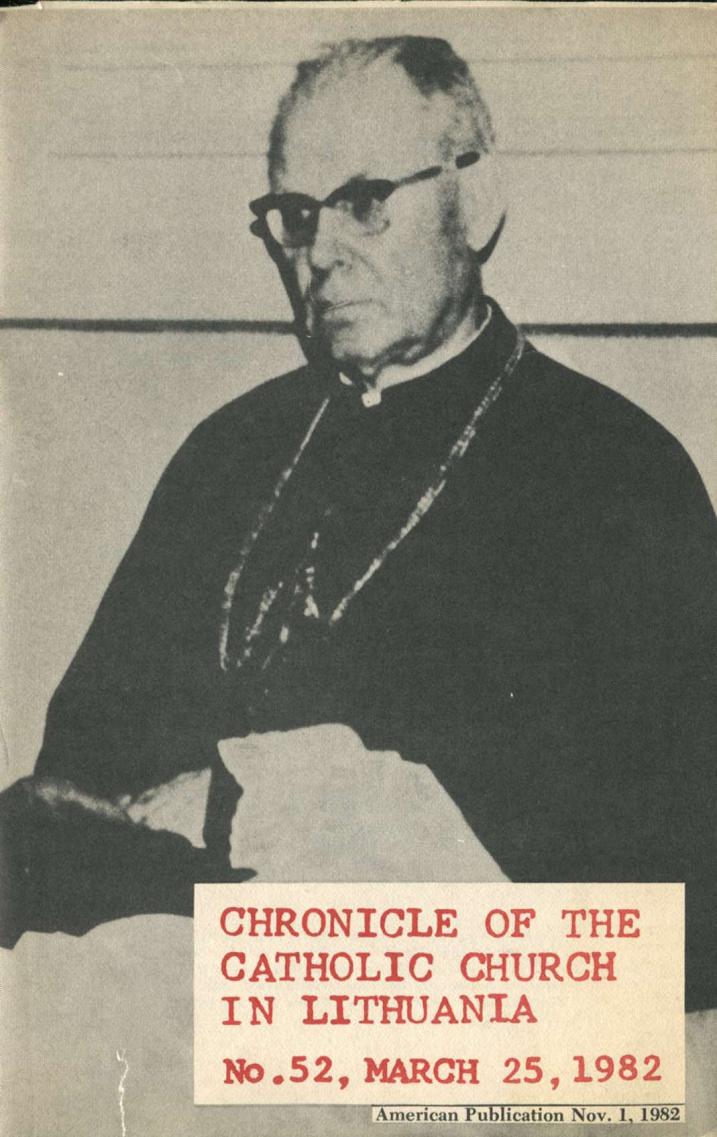
On the Cover: Bishop Julijonas Steponavičius, appointed as Apostolic Administrator of the Diocese of Panevėžys and the Archdiocese of Vilnius by the Vatican in 1958. In 1961, he was arrested by Soviet authorities and exiled to Žagarė, located outside his two dioceses, thus preventing him from exercising his duties to this day.
With the collapse of the civil government's plan to have its candidates for bishop confirmed, it became necessary to find someone to blame. An anonymous writer proposed to achieve this during the Christmas 1981 holidays by sending out a vile and slanderous letter to various individuals, the purpose of which was to sow further confusion in the homeland and the West. It is very peculiar that one Ordinary called this anonymous letter a "strong document". Since the anonymous letter parrots the views of the KGB toward Bishop Julijonas Steponavičius and active priests, we would like to make some comments.
The anonymous author explains that during the period when the dioceses of Lithuania were governed not by bishops but by administrators, "there appeared various cliques of snobs-careerists... which hampered the work of the Ordinaries."
Careerist priests behaved quite the opposite of what the anonymous letter claims. While a third of the priests faithful to the Church suffered in the Soviet Gulag, careerist priests allowed themselves to be drawn into the KGB web, signed documents even against Pope Pius XII and thus climbed the ladder of success. The priests who attempted to fight against the KGB's efforts to subjugate the Catholic Church in Lithuania to the interests of the Communist state did not seek a career. Their career consisted of continual lectures, threats, remote parishes, labor camps, etc.
The trial of Father Leonas Mažeika's killers took place in Pakruojis during January 26-28, 1982. The trial was held in the cultural center hall which accommodated some three hundred people while the rest followed the trial proceedings via loudspeakers in an adjoining room.
The circuit session of the Supreme Court of the Lithuanian SSR was presided over by M. Ignotas. The people's count-, were (Mrs.) Kasiulienė and Smičius. The state prosecutors were were Lithuanian SSR Assistant Prosecutor B. Žeberskis; Šiauliai at torney (Miss) Kručaitė defended the accused Kazlauskas, Pakruojis attorney Mesonis defended (Mrs.) Baltramiejūnienė.
The defendants — Ona Baltramiejūnienė and Adolfas Kazlauskas — were accused at once of three offenses:
— Wounding Pamerneckas;
— Murdering Father Leonas Mažeika and Sister Teklė Martinaitytė on August 8, 1981;
— Robbing the Vilūnaitis store.
To: First Secretary Petras Griškevičius of the Central Committee of the Communist Party of Lithuania.
A Statement from: Father Kastytis Jonas Matulionis, son of Leonas, res. in Vilnius, Gorkio 17-6.
On February 17th of this year, Vice Chairman Urbonas of the Vilkaviškis Rayon Executive Committee came to Kybartai and demanded that Vice Chairman Kostas Abraitis of the Kybartai Church Committee sign a document demanding that I be forbidden to perform my priestly duties in the Kybartai church, allegedly because I am not a priest, have not graduated from the theological seminary, the bishop knows of no such priest, Father Sigitas Tamkevičius, the pastor, simply invited me, etc. The Kybartai Church Committee Vice Chairman did not sign this document because decisions about the priesthood are not made by church committee members or government officials but by spiritual authorities.
While the Kybartai, Vice Chairman Urbonas lectured at several organizations and made references to me, slandering me and calling me an imposter.
What is an imposter? The Current Lithuanian Language Dictionary (Mintis, Vilnius, 1972, p. 34) defines "impostor" as follows: 1. One who pretends to be another, illegally claims a title or another's name. 2. One who makes claims, boasts, publicizes himself.
The definition does not apply me: I claim no title nor another's name; I did not boast or publicize myself. This task is performed by Executive Committee Vice Chairman Urbonas himself.
Following his speeches, Vice Chairman Urbonas left the Kybartai Executive Committee Chairman a letter, of which I was later apprised in his office.
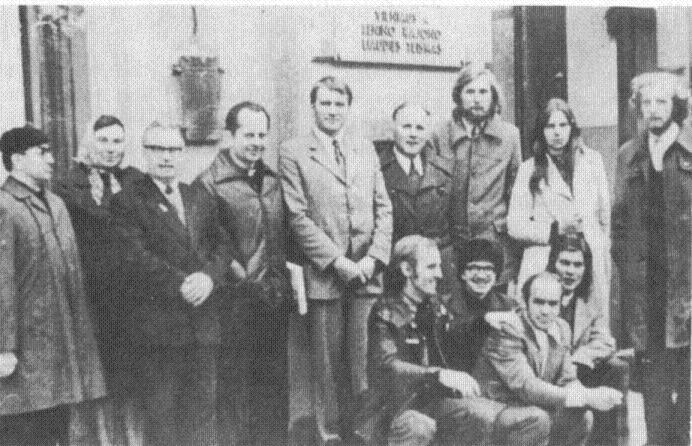
Activists for religious freedom and human rights in Lithuania: (left to right, standing) Father Kastytis Matulionis, unknown woman, Mečislovas Jurevičius, Rev. Sigitas Tamkevičius, Antanas Terleckas, Algis Statkevičius, Liutauras Kazakevičius, Eleonora Sasnauskaitė, Gediminas Rickevičius. (Sitting left to right) Algimantas Andreika, Robertas Grigas, Jonas Volungevičius, Kęstutis Subačius.
On February 2, 1982, the Prienai Rayon newspaper Naujas gyvenimas (New Life) reprinted an article entitled "Melas iš sakyklos" ("Lies from the Pulpit") from Tiesa (Truth) (January 26, 1982), directed against Šilalė Assistant Pastor Father Vytautas Skiparis and added the following comment: "Assistant Pastor Antanas Gražulis of the Prienai church and pastor Zenonas Navickas of the Užuguostis church (brother of the woman imprisoned for duplicating the Chronicle of the Catholic Church in Lithuania — Ed. Note), in attempting to discredit teachers, Communists,and in general, all atheists in the eyes of the believers, are employing the methods used by Šilalė Assistant Pastor Vytautas Skiparis named in the newspaper."
The faithful of the Prienai parish sent government agencies a strong letter of protest bearing 1,500 signatures. The letter states that the newspaper has made false charges against their assistant Pastor, Father Antanas Gražulis.
On February 3, 1982, Father Antanas Gražulis was punished for visiting the homes of believers while fulfilling his priestly duties.
A letter of protest signed by 1,483 Prienai believers was sent to First Secretary Griškevičius of the Central Committee of the Lithuanian Communist Party. We reprint an abbreviated version of the protest:
"On February 3, 1982, the Prienai Rayon Administrative Commission imposed a 50-ruble fine on our assistant pastor, Father Antanas Gražulis, for visiting our families in the Town of Prienai during the month of January 1982. He allegedly thereby violated the May 12, 1966 Decree of the Supreme Soviet Presidium of the Lithuanian SSR which we never saw published in newspapers. We did not even know that such a ban is based on law and not some kind of atheist prohibition.
On December 5, 1981, security agents and militiamen surrounded and forced their way their way into the home of Magdalena Kuncevičiūtė (at Alyvų g. No. 4), where Father Pranciškus Šulskis was celebrating Holy Mass and a group of believers was praying. Father Pranciškus Šulskis was shot by chekists in 1946 and has been unable to use his legs for the past thirty-six years and therefore always offers Holy Mass in his room.
The intruders began to photograph the praying people. The chekists went through all the rooms, photographed the rosaries and books they found, searched the attic and confiscated issue No. 49 of the Chronicle of the Catholic Church in Lithuania they found on a table. The security agents insisted that the praying immediately cease and documents be produced. Despite the din the intruders caused, the assembled people sang hymns and recited part of the rosary. When the women requested that the intruders identify themselves, only Housing Authority Chief Granickas gave his name. One security agent stated that a complaint had been received that young people are lured into this house. After the documents were checked. Father Šulskis was carried back to his home under security agent escort. The officials drafted a report but the homeowner refused to sign it.
Those who did not have their papers with them were forcibly placed in vehicles and taken to the militia department "for identity verification." Three security agents who did not dare give their names questioned the women. When one woman refused to talk to an unidentified interrogator, Major Arbačiauskas gave his name. Some of the detained women were repeatedly interrogated, others were taken home to check their documents or were forced to write explanations. At 11:00 P.M., after four hours of interrogation, the women were allowed to go home, but their troubles did not end there. New interrogations were immediately launched.
Viduklė
To: First Secretary P. Griškevičius of the
Communist Party of Lithuania A Letter of Protest from: The faithful of the
Viduklė parish
We, the believers of the Viduklė Roman Catholic parish, who toil every day in Soviet agriculture and industry, often enduring shortages of the most basic needs, would wish but one thing: allow us to practice our faith freely and raise our children as good people. We can accomplish this only by raising our children in the spirit of the Gospel. We see forcibly imposed atheism in Lithuania leading our nation into a mire of sin; our nation is striding toward physical and spiritual destruction.
We would like to have the freedom guaranteed by the Constitution of the Lithuanian SSR, the international agreements signed by the USSR, the Universal Declaration of Human Rights and the Helsinki Final Act. We, simple people and ordinary citizens, understand the laws as follows: if the Soviet government signed them, it is obligated to observe them!
Unfortunately, in actual practice this basic minimum is still far out of reach. We will mention but a few instances of religious discrimination which we, the people of Viduklė, have had to suffer.
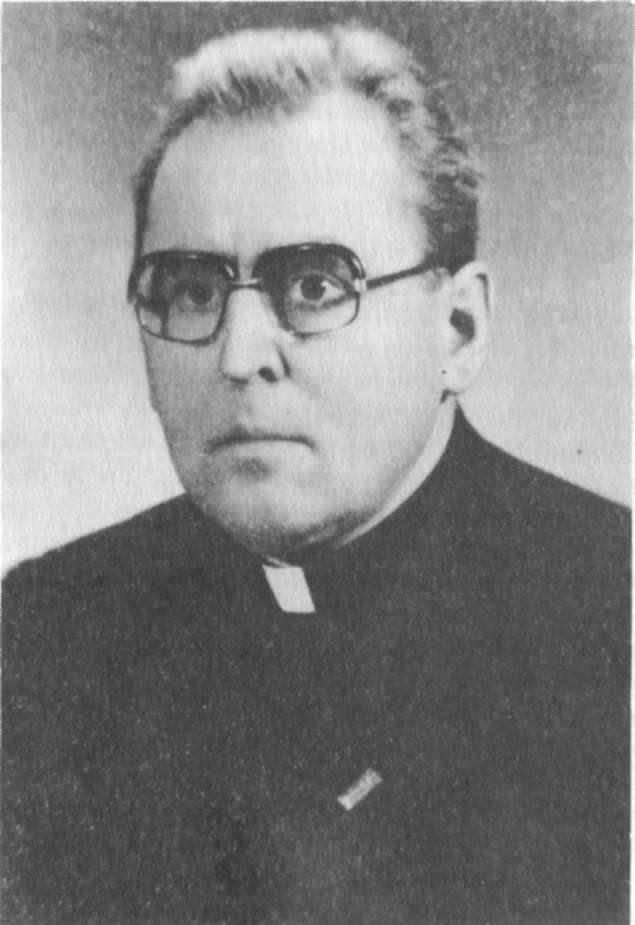
Fr. Alfonsas Svarinskas, Member of Catholic Committee
Bijutiškis
To: The Central Committee of the Communist Party of Lithuania.
The Vaga Publishers in Vilnius.
My conscience compels me to speak out one more time and condemn moral hooliganism and its propagators in the Soviet press.
In September of last year, I wrote you regarding Bronius Jauniškis' booklet Be iliuzijų (With No Illusions) published by Vaga, which is full of the crudest lies, distorted facts, falsifications and degradation of those who hold different views. Rather than correct the error, the Vaga publishers evaded the issue, claimed that "the said book is carefully prepared for the press and accurately depicts individuals."
I will briefly review here the main events. In the fall of 1926 Juozas Misiūnas enrolled in the fifth year of the Jesuit high school in Kaunas and took up residence in the students' dormitory located near the high school. He graduated in 1930 and entered the Pagryžuvis Jesuit Novitiate near Tytuvėnai. He spent one year in Mittelstein in Silesia, returned to Kaunas in the summer of 1933 and was prefect for a group of students at the Jesuit high school dormitory during the 1933—34 academic year. He left the Jezuits in the summer of 1934. He was healthy; doctors could detect no illness. His eyes were also healthy: he did not wear glasses. After studying for a time, he taught in high schools. In 1939 he married Sofija Katkevičiūtė and raised four daughters. During the German occupation, he worked as a translator at the Panevėžys railway station. After the war, from 1946 to 1949, he taught at the Ramygala, the Užpaliai and from 1951 at the Antalieptė Middle Schools. His eyes were healthy; he did not wear glasses. And only in 1955, as his wife Sofija Misiūnienė testifies, did her husband's eyes begin to fail: his vision at times became cloudy, especially when he was upset. The disease progressed and in the last two or three years before his death (he died in October, 1971) Juozas Misiūnas became half-blind, an invalid.
On December 25, 1981, the Catholic Committee for the Defense of Believers' Rights wrote Document No. 50 to Secretary General Leonid Brezhnev regarding the crude campaign against believing youth in Lithuania, which Soviet officials launched in 1981. The document refers to the mistreatment of a group of young people in Molėtai, the arrest of Father Ričardas Černiauskas, the detention in Šlavantai of young people from Kybartai, the forced entrance by the militia and detention of young people in Vilkaviškis, the forced entrance in Kapsukas (formerly Marijampolė) into the apartment of (Miss) Kuncevičiūtė.
"Although considerable time has elapsed since these events, the terrorization of believing young people still continues: they are interrogated, threatened and told that such meetings amount to activity against the Soviet government. . . With the adoption of the new Constitution of the USSR and the declaration that we are striding into a period of mature socialism, is it still necessary to employ such inhuman and disgraceful methods to fight against believing young people?" asks the document.
On December 25, 1981, the Catholic Committee for the Defense of Believers' Rights sent document No. 51 to Secretary P. Griškevičius of the Central Committee of the Communist Party of Lithuania , in defense of Father Jonas Bučinskas, pastor of Stulgiai, and Father Juozapas Razmantas, pastor of Žalpiai, who were charged with organizing "a demonstration to the cemetery" on November 1, 1981.
Large crowds of people — a thorn in the side of Lithuania's militant atheists — attend the devotions at Šiluva, Aušros Vartai (Gate of Dawn in Vilnius and Žemaičių Kalvarija (Calvary of the Samogitians). In 1981, only the Žemaičių Kalvarija devotions at the beginning of July passed without incident.
In August, prior to the Feast of Our Lady of Šiluva, a "pig plague" quarantine, which is still in force was organized in the vicinity of Šiluva. Right up to the beginning of the festival, the faithful did not know whether it would be possible to go to Šiluva, therefore, fewer people attended than in earlier years. The atmosphere at the devotions was also depressing. Militia vehicles patrolled the yards of Šiluva inhabitants and recorded car license numbers. At the church, the people were puzzled to hear certain sermons about suicide, murder, etc. The believers wondered, "Why are such problems raised during the major Šiluva devotions, when the best people come to Mary's shrine from all corners of Lithuania? They have no intention to commit either murder or suicide . . ."
Devotions to the Merciful Mother of God at Aušros Vartai (Gate of Dawn) in Vilnius are much more difficult to disrupt: how can a pig plague be declared in Vilnius? Here the major devotions are suppressed in a different way: even the people of Vilnius have a difficult time learning of these devotions because only St. Teresa's church announces them. At other churches, only an occasional priest makes the announcement.'
Klaipėda
In June and August of 1981, delegations of Klaipeda Church Committee members and believers went to Moscow to see the Central Committee of the Communist Party and Chairman Kuroyedov of the Council for Religious Affairs, bearing petitions from believers requesting the return of the Catholic church in Klaipeda, illegally confiscated by the government. The text of the petition:
"We, the faithful of the City of Klaipeda and the entire Catholic Church in Lithuania appeal to you, Chairman of the Supreme Soviet, asking you to return the Catholic church in Klaip6da built with our funds and work.
"The construction of this church was begun in 1956, upon receipt of permits from the Supreme Soviet Presidium, the USSR Council of Ministers and the Council of Ministers of the Lithuanian SSR. When the church was completed in 1961, but before it began to function, it was confiscated from the faithful at the order of then-Chairman Khrushchev of the Supreme Soviet Presidium.
"Currently, the church built our funds and labor has been converted into a philharmonic hall, while we faithful, having built such
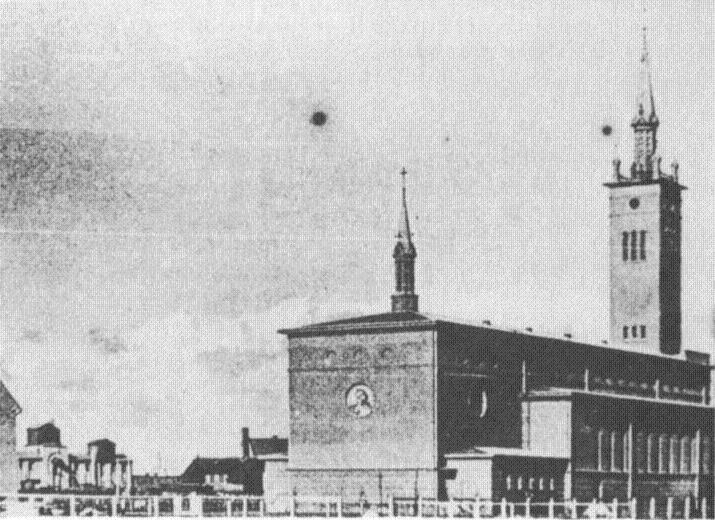
Our Lady Queen of Peace Church in Klaipeda, shortly after completion in 1962.
a spacious church, must suffer heat and overcrowding in a small (220 m. — 2,350 sq. ft.), church or freeze outside. The city of Klaipeda and its suburbs have some 100,000 believers.
"Feeling unjustly wronged, we appealed to the Religious Affairs Commissar in Moscow, in 1974 with some 3,500 believers' signatures. In March, 1979, with 10,241 signatures and in October, 1979, with 149,149 signatures, we appealed to you, Chairman Brezhnev of the Supreme Soviet Presidium, and to Religious Affairs Commissar Kuroyedov requesting that our church be returned.
To: The Minister of Education of the Lithuanian SSR On September 9, 1981, the funeral of Mrs. Vanda Misiūnienė was held in Švenčionys. Her son Petras Misiūnas was an 8th-grader at the Švenčionys Middle School; therefore, twenty-six of his classmates attended the funeral. When the deceased was brought to the church, Homeroom Teacher (Mrs.) Nijolė Bieliauskienė chased all the students from the church, at the order of school Principal (Mrs.) Stuikienė.
The Church is separate from the school, therefore the teachers had no right to give orders in church, disrupting the solemnity of the services. The majority of the students who attended the funeral are believers and regularly attend church. The forcible expulsion of such students from the church is a crude violation of the right to practice religious cult.
Educators continually violate Soviet laws and are never punished Through such conduct, the educators debased both the dead and their families, and this is inconsistent with either pedagogy or human-ness. If the beliefs of older people are ridiculed, the young learn not to respect their elders, their parents, and become coarse. This leads them to humiliate people who hold different beliefs. It was probably under the influence of such unhealthy pedagogy that religious tombstones were destroyed in the Dūkštas, Rimšė, Plungė and other cemeteries.
When they prevent students from attending the funerals of believing persons, educators destroy their own authority. No one can respect an educator who does not practice the respect he preaches toward people who hold other beliefs.
What do teachers fear? That the students will hear the sermon? In such cases, priests will be forced to speak at the cemetery. Such teacher conduct is mere atheist fanaticism.
October 4, 1981 Father Edmundas Paulionis,
Assistant Pastor of the Švenčionys parish.
Aušra (The Dawn),, No. 29. The issue reports about the late Father Bronius Laurinavičius and his death, Lithuania's russifica-tion, etc. The publication appeared at the end of 1981.
Tautos kelias (The Nation's Road), No. 2, appeared at the end of 1980 and is dedicated to the 550th anniversary of the death of Vytautas the Great.
Tautos kelias (The Nation's Road), No. 3, appeared in November, 1981. It contains articles on the Servant of God Archbishop Jurgis Matulevičius, the damage of the atheist campaign, etc.
Correction: Issue No. 51 of the Chronicle of the Catholic Church in Lithuania stated that Jadvyga Stanelytė was sentenced in 1979. It was actually in 1980.
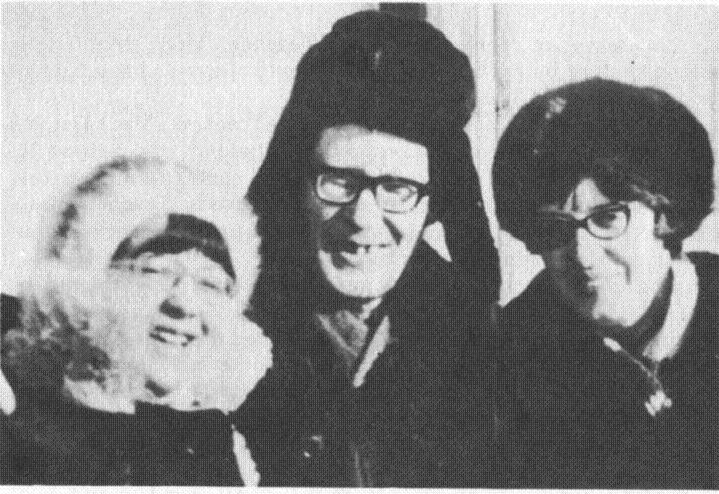
Sergei Kovalev in exile, Magadan region, March 1982, with wife and daughter.





